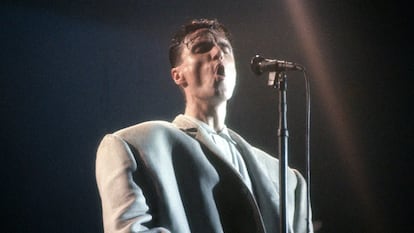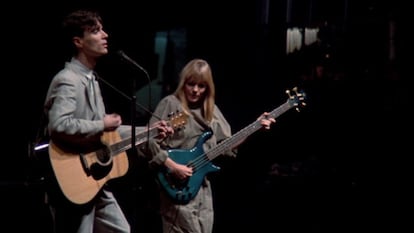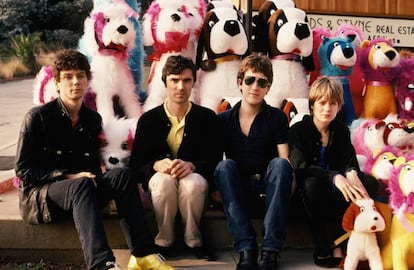Talking Heads: ‘We were really good... what a shame about the band!’
The four members of the highly influential indie band that broke up in 1991 talk about the re-release of ‘Stop Making Sense,’ their 1984 Hollywood concert film


Released in 1984, Stop Making Sense is still one of the best concert films ever made. The collaboration between Talking Heads and director Jonathan Demme at the Pantages Theater in Hollywood was a key milestone in using a live concert recording to merge cinema and music. The New Hollywood era had reshaped the role of sound in film, with movies like American Graffiti (1973), The Conversation (1974), Blow Out (1981) and Nashville (1974) paving the way. Martin Scorsese’s The Last Waltz rockumentary about The Band set the stage for capturing live music experiences, and Stop Making Sense, with the Talking Heads’ unique, post-modern aesthetic, became another classic in its own right.
The remastered film with enhanced sound and visuals will be released again on March 8 in theaters. David Byrne, Chris Frantz, Tina Weymouth and Jerry Harrison, the four band members who went their separate ways in 1991, gathered virtually from their homes to talk to us about the movie and their legacy. The reunion comes after years of disagreements and legal battles initiated by Byrne, who didn’t want his ex-bandmates to use the Talking Heads name unless he was involved.
Question. Forty years later, what were your thoughts upon seeing yourself again in the documentary?
David Byrne. I hadn’t seen the concert in 15 years, and all these thoughts came rushing back. Who’s that intense guy? Does he have a sense of humor? Does he ever relax? He looks super focused.
Chris Frantz. We all look handsome and Tina very beautiful [Tina is Chris’s partner and were on camera together].
Tina Weymouth. Come on! You know, it’s just great that we’ve got this movie. It’s a gem, and it’s wonderful how Jonathan Demme came into our lives to make it.
Jerry Harrison. We played very well. We were incredibly disciplined about not stepping on each other’s toes. We were really good.
Tina Weymouth. What a shame about the band!
Question. The film totally envelopes the viewers. You can see the knowing smiles, the spontaneous movements, the sweat...
J. H. It has some elements of a horror movie. It’s like being inside a crypt.
D. B. Jonathan was very good at capturing each one of us individually, and also interacting with each other. It looks great how we connect with a smile or a simple touch.
T. W. The new print was created from the original negative. It’s much easier to see colors, lighting... and even the finer details like eyes, lips, tongues and teeth. Oh, and the sound is so much better now! Watching this movie just makes you want to dance — it’s beautiful.

Question. The film is a testament to your love for funk and rhythm and blues.
D. B. The first time we got together was in our loft. We brought all our records and threw them on the floor — albums by Parliament, Funkadelic, Hamilton Bohannon, James Brown, Velvet Underground, Lou Reed, David Bowie and The Stooges. Picture all those albums jumbled up — that’s something like what we wanted to be.
Question. What excited you the most in the 1970s when you began playing at CBGB in New York City?
J. H. CBGB itself, and its owner, Harry Crystal. He was very generous about giving people time on open mic nights. We could probably survive a month on what we made in a weekend playing there. There was a great sense of mutual support. Competition between bands only began when big labels entered the scene.
D. B. New York has changed so much. CBGB’s gone now. We all used to think we were in the coolest spot on earth, where all the new music and artsy stuff was happening. We weren’t getting noticed much, but we all felt like part of the gang, despite our musical differences. On tour with the Ramones, we were like ships passing in the night, but we respected each other and they loved what we were doing. I visited New York recently... Soho, man, what happened? It’s all gone, feels like a giant parking lot now, no funky shops. Where are those old factory buildings we used to love? We would hang around the Bowery, which was littered with drunks and druggies. Sure, it wasn’t beautiful, but it was a whole different world. The city was broke back then, so they left us alone, ignored the whole scene, let things unfold. It felt like we were in our own exclusive club of anonymous musicians.
C. F. And you know, it was better than it is now. We would make posters and stick them up all over Soho and the Bowery because we felt like that was our world.
T. W. Artists used to live there, but now they can’t afford it. They were pushed into Brooklyn, then to other parts of the world. New York isn’t the artistic hub it used to be. It still has amazing museums, but they’re all about the past. The city was struggling back then. Trash piled up in the streets, and everything looked shabby and neglected. Yet there was so much life... There was a new energy all over the U.S. You could dream big. Money didn’t dictate fun. Nowadays, if you’re not part of a big production, it’s like you’re invisible.
J. H. Two important things were happening. First, New York had an abundance of empty lofts after the industry exodus, which could be rented at affordable prices. Second, and more significantly, there was a strong sense of community. This camaraderie extended beyond musicians to dancers, visual artists and painters. New York was the hub of avant-garde culture, akin to what was once seen in Paris or Vienna. The city exuded avant-garde vibes, and we freely shared ideas when we were all complete unknowns.

Question. Did you consider yourselves pioneers even then?
T. W. We didn’t think we could compete with Steely Dan, The Eagles, and all those kinds of groups. We weren’t really into that. I guess we were like the new kids on the block. We had Patti Smith and Television just two blocks away. We’d go check them out and be like, “Wow!” Seeing them made us step up our game and figure out what we wanted to do with our music.
D. B. I think we were very thoughtful about it and left room for growth. We let our audience know that we were going to change, that we were going to try different things and that they wouldn’t like everything. That was important.
J. H. This is one of the things that really makes music less interesting nowadays. Back when we began, we put out an album every year for the first four years and hit the road to promote it. Those albums were around 35 to 40 minutes tops. Then came CDs, and suddenly we had folks making 70-minute records. The record labels got very conservative, pushing you to replicate your past successes. Remember The Beatles? They were churning out more than one album a year, and nobody wanted them to rehash old stuff. Change was expected.
Question. Do you think your legacy has been significant?
T. W. We never played our records for our kids. They didn’t really know much about the Talking Heads until they hit 18 or 20. They grew up listening to their own stuff and we never aimed to compete with that. But I think they now understand what we did and feel our impact. And you know what? The good old days are gone and they’re not coming back. Maybe that music energy has now shifted over to the food scene.
J. H. Well, the younger generations stream all their music and that means they don’t know where the songs come from. Too many song files all the time.
D. B. You know, sometimes you’re in a restaurant and you see people listening to some streaming Talking Heads tunes. And they’re lovin’ it without knowing or caring about who made that music.
T. W. Have we become elevator music? (laughs)
Question. What advice would you give to a musician starting out?
T. W. Work very hard and don’t give up. You work so hard, right? And then you’re like, ‘Oh, this isn’t working.’ But hey, you’ve put in all that effort! Don’t just toss it aside. Keep pushing forward.
C. F. I saw a Banksy, a Banksy piece that said: “If you get tired, learn to rest, not to quit.” Exactly! No one gets enough sleep. That’s how I feel today (laughs)! Just rest.
D. B. When we began, there were around 20 people in the audience. A few weeks later, it doubled to 40. You can build on things, just keep pushing forward. Establish connections, you know?
T. W. A big part of it is all about connection. I mean, it’s not just the music, right? Look at Taylor Swift — she’s got all these young girls who adore her. They know all her songs, no doubt. Me? I couldn’t even identify a Taylor Swift song. I come from a different generation, you know? But she’s got that special something. She’s like the new Princess Diana — some artists just have that magic touch. I still remember wondering, ‘How are we going to make it in the U.S?’ I mean, the U.S. was all about Dolly Parton and country music back then. But people liked the Talking Heads too because we had this sound that resonated with them. We had our own unique style and this cool way of connecting with others.
J. H. A tip for up-and-coming musicians: we used to work very hard and toured all the time, more than any band from CBGB except for the Ramones. Unlike other bands, we focused on cultivating a genuine audience by actively engaging with them. Having an experienced manager who understood the industry and touring helped a lot. We also kept ticket prices low and avoided getting into debt with our record label. My advice to any band would be to be very cautious about spending money.
Question. This has been a very amiable conversation, so I have to ask the question. Can we look forward to a Talking Heads reunion?
[Laughs all around]
J. H. This interview is a baby step. A reunion would be a much bigger step, so we can’t even think about that right now. We’re focused on the film.
C. F. See you next time.
T. W. See you.
D. B. Bye.
Sign up for our weekly newsletter to get more English-language news coverage from EL PAÍS USA Edition
Tu suscripción se está usando en otro dispositivo
¿Quieres añadir otro usuario a tu suscripción?
Si continúas leyendo en este dispositivo, no se podrá leer en el otro.
FlechaTu suscripción se está usando en otro dispositivo y solo puedes acceder a EL PAÍS desde un dispositivo a la vez.
Si quieres compartir tu cuenta, cambia tu suscripción a la modalidad Premium, así podrás añadir otro usuario. Cada uno accederá con su propia cuenta de email, lo que os permitirá personalizar vuestra experiencia en EL PAÍS.
¿Tienes una suscripción de empresa? Accede aquí para contratar más cuentas.
En el caso de no saber quién está usando tu cuenta, te recomendamos cambiar tu contraseña aquí.
Si decides continuar compartiendo tu cuenta, este mensaje se mostrará en tu dispositivo y en el de la otra persona que está usando tu cuenta de forma indefinida, afectando a tu experiencia de lectura. Puedes consultar aquí los términos y condiciones de la suscripción digital.








































